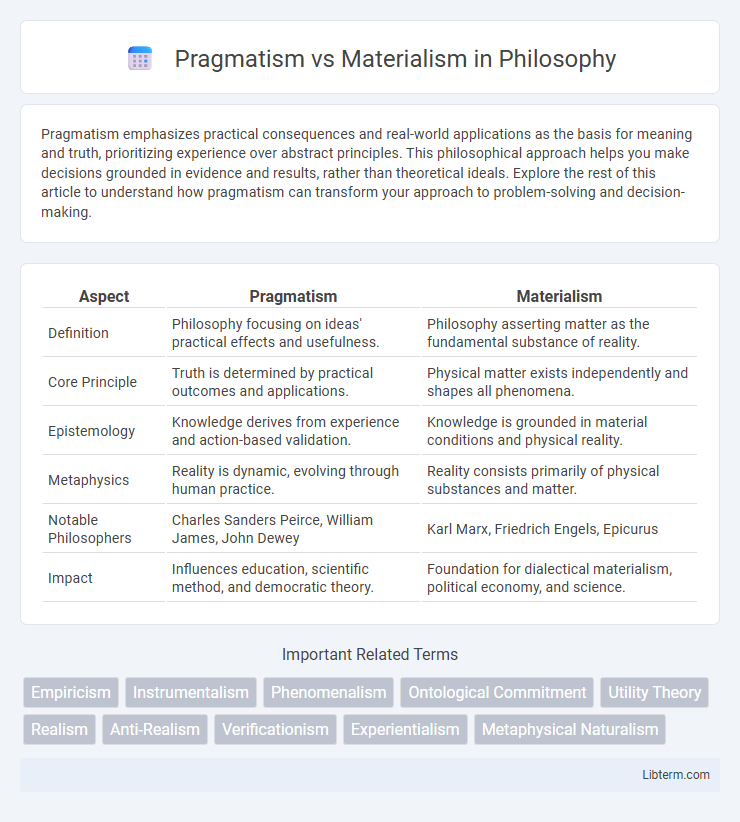Pragmatism emphasizes practical consequences and real-world applications as the basis for meaning and truth, prioritizing experience over abstract principles. This philosophical approach helps you make decisions grounded in evidence and results, rather than theoretical ideals. Explore the rest of this article to understand how pragmatism can transform your approach to problem-solving and decision-making.
Table of Comparison
| Aspect | Pragmatism | Materialism |
|---|---|---|
| Definition | Philosophy focusing on ideas' practical effects and usefulness. | Philosophy asserting matter as the fundamental substance of reality. |
| Core Principle | Truth is determined by practical outcomes and applications. | Physical matter exists independently and shapes all phenomena. |
| Epistemology | Knowledge derives from experience and action-based validation. | Knowledge is grounded in material conditions and physical reality. |
| Metaphysics | Reality is dynamic, evolving through human practice. | Reality consists primarily of physical substances and matter. |
| Notable Philosophers | Charles Sanders Peirce, William James, John Dewey | Karl Marx, Friedrich Engels, Epicurus |
| Impact | Influences education, scientific method, and democratic theory. | Foundation for dialectical materialism, political economy, and science. |
Introduction to Pragmatism and Materialism
Pragmatism emphasizes the practical application of ideas by assessing their truth through tangible outcomes and experiential results, rooted in the philosophies of Charles Sanders Peirce and William James. Materialism, grounded in the belief that physical matter is the only reality, asserts that all phenomena, including consciousness, arise from material interactions, prominently represented by thinkers like Karl Marx and Epicurus. These foundational viewpoints shape contrasting approaches to knowledge, reality, and human experience in philosophy.
Defining Pragmatism: Key Principles
Pragmatism, rooted in the philosophy of Charles Sanders Peirce and William James, emphasizes the practical consequences of beliefs as the core criterion for their truth and meaning. Its key principles include the idea that concepts and theories must be evaluated based on their usefulness and effectiveness in real-world applications rather than abstract absolutes. This approach contrasts with materialism by prioritizing experiential outcomes and adaptability over solely physical or economic determinants.
Understanding Materialism: Core Concepts
Materialism posits that physical matter is the fundamental substance of reality, asserting that all phenomena, including consciousness and thought, arise from material interactions. Central to materialism is the belief in a purely physical universe governed by natural laws, rejecting supernatural explanations. This philosophy emphasizes empirical evidence and scientific inquiry as essential methods for understanding the nature of existence.
Historical Development of Pragmatism
Pragmatism emerged in the late 19th century as a distinctly American philosophy, primarily developed by thinkers such as Charles Sanders Peirce, William James, and John Dewey, emphasizing the practical consequences of ideas as the key to their meaning and truth. This movement arose partly in response to the limitations of classical metaphysics and materialism, which focused predominantly on physical reality and objective facts. Pragmatism's historical development reflects a shift toward evaluating concepts through their experiential and functional impact, influencing areas like education, law, and social reform.
Evolution of Materialist Thought
The evolution of materialist thought traces back to ancient philosophy, emphasizing physical substance as the fundamental reality, gradually integrating scientific discoveries such as Darwinian evolution and quantum mechanics. Materialism shifted from classical mechanistic interpretations to dialectical and historical materialism, highlighting socio-economic factors as drivers of change in nature and society. This transformation contrasts with pragmatism's focus on practical consequences and utility, while materialism remains anchored in the objective existence and interactions of matter.
Philosophical Differences: Pragmatism vs Materialism
Pragmatism emphasizes the practical consequences and usefulness of ideas as the core criterion for truth, focusing on experience and action rather than abstract theory. Materialism asserts that physical matter is the fundamental substance in reality, with all phenomena, including consciousness, resulting from material interactions. The philosophical difference hinges on pragmatism's flexible, outcome-based truth evaluation versus materialism's ontological commitment to matter as the primary reality.
Applications in Modern Society
Pragmatism influences modern society through its emphasis on practical solutions and adaptive strategies in education, technology, and policymaking, promoting outcomes that work in real-world contexts. Materialism shapes economic and consumer behavior by prioritizing physical assets and tangible wealth, driving market trends and influencing social values centered around ownership and capital. Both philosophies intersect in areas like sustainable development, where practical approaches to material resource management optimize efficiency and societal well-being.
Influence on Ethics and Decision-Making
Pragmatism influences ethics by emphasizing practical consequences and real-world outcomes as criteria for moral judgment, prioritizing adaptability and problem-solving in decision-making. Materialism grounds ethical considerations in the physical and economic conditions shaping human behavior, often leading to decisions focused on tangible resources and survival needs. Both philosophies shape decision-making processes, with pragmatism fostering flexible, results-oriented ethics, while materialism emphasizes the impact of material conditions on moral values.
Pragmatism and Materialism in Contemporary Debates
Pragmatism in contemporary debates emphasizes practical consequences and the applicability of ideas as criteria for truth, often prioritizing experiential learning and adaptive problem-solving over abstract theory. Materialism, particularly in its physicalist form, asserts that all phenomena can be explained through matter and physical interactions, grounding discussions on scientific empiricism and the nature of reality. These perspectives clash and converge in fields like philosophy of mind, ethics, and science, where pragmatism's focus on usefulness contends with materialism's commitment to ontological reductionism.
Conclusion: Choosing Between Pragmatism and Materialism
Choosing between pragmatism and materialism hinges on one's emphasis on practical outcomes versus the primacy of physical reality. Pragmatism values ideas and beliefs based on their utility and effectiveness in addressing real-world problems, whereas materialism asserts that physical matter is the fundamental substance of all phenomena. A balanced approach considers the strengths of pragmatism's actionable insights while acknowledging materialism's grounding in empirical evidence and observable facts.
Pragmatism Infographic

 libterm.com
libterm.com